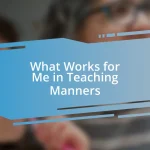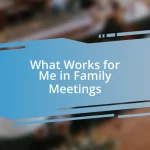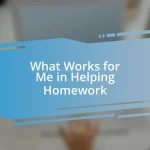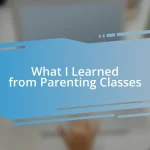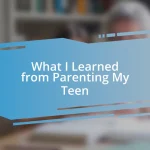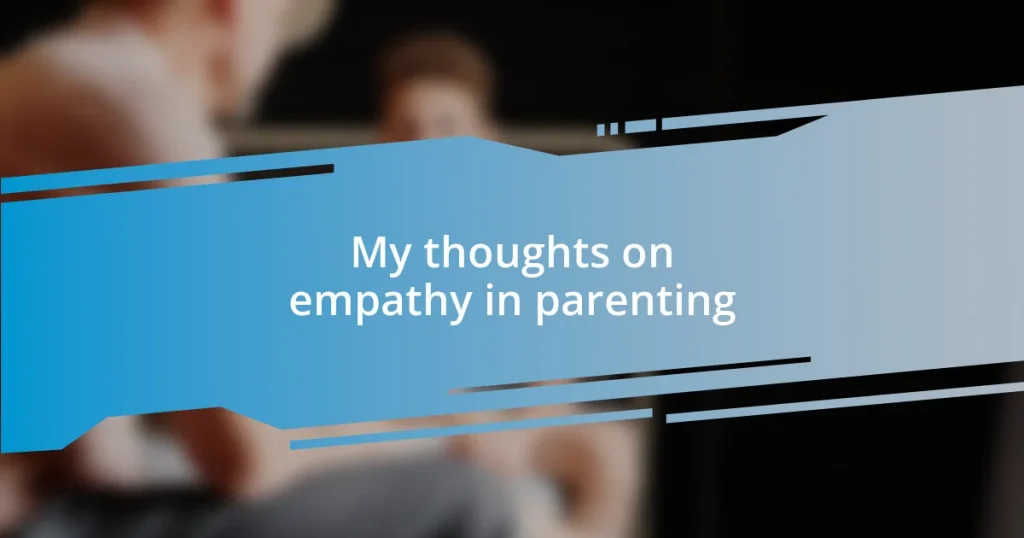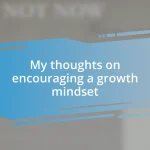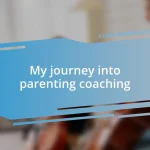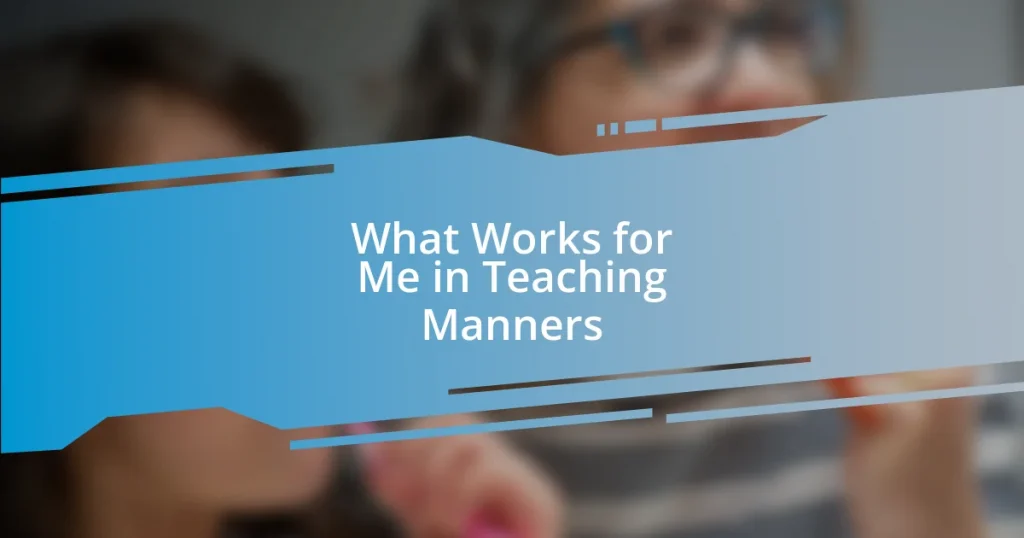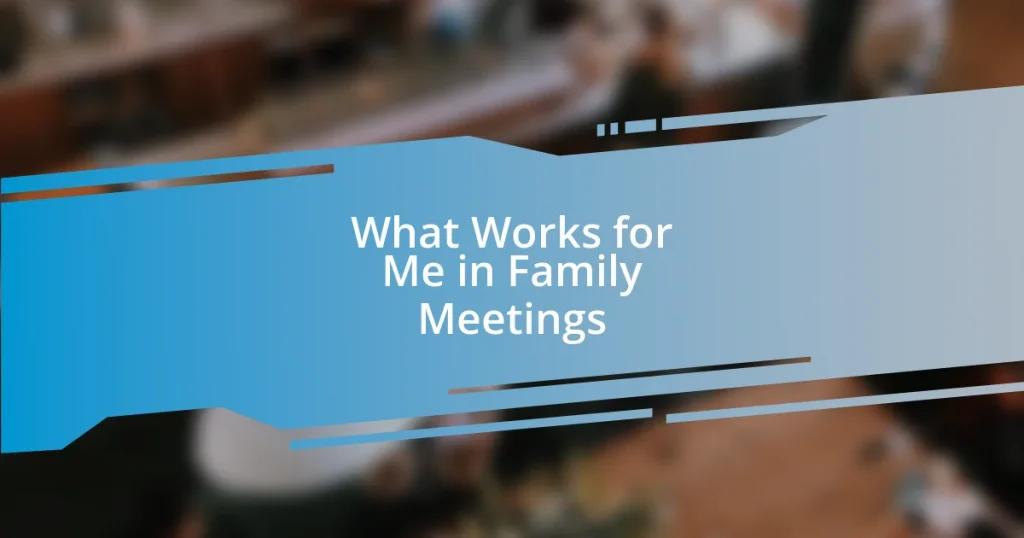Key takeaways:
- Empathy in parenting fosters a deeper emotional connection, allowing children to feel seen and heard, which enhances their emotional intelligence and communication skills.
- Using strategies like modeling behavior, role-playing, and storytelling effectively cultivates empathy in children, helping them understand and navigate their own emotions and those of others.
- Active listening techniques, such as mirroring and reflective listening, create a safe environment for children to express their feelings, transforming conflicts into learning experiences and strengthening relationships.
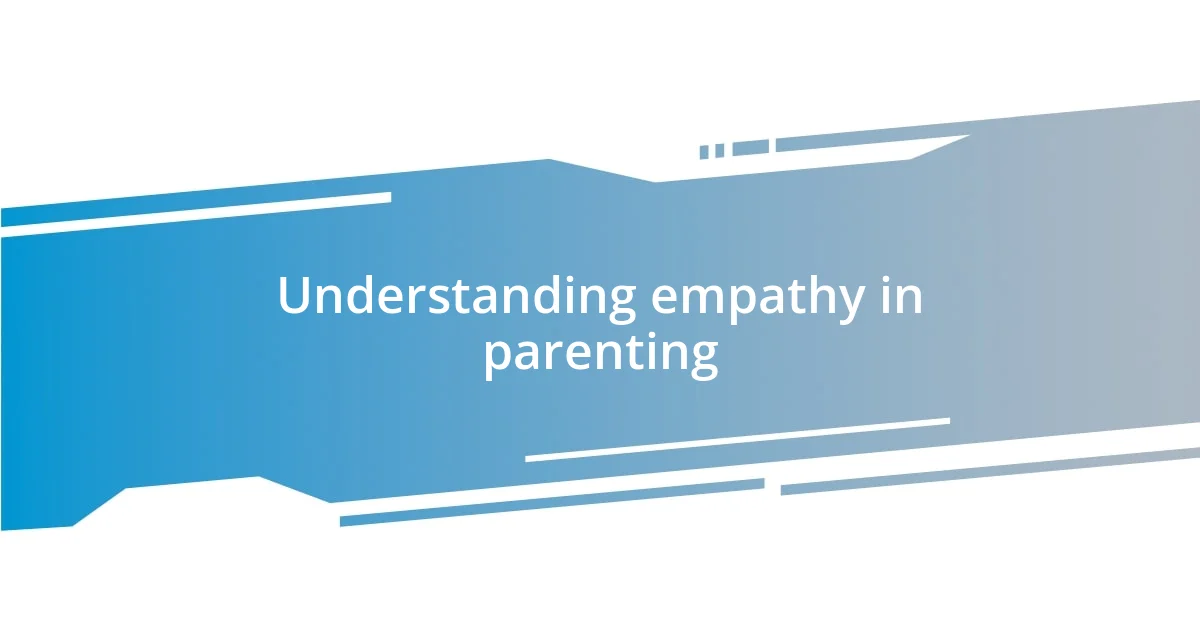
Understanding empathy in parenting
Empathy in parenting is more than just understanding a child’s feelings; it’s about connecting with their emotional world. I remember a day when my child burst into tears over a seemingly trivial issue—losing a favorite toy. Instead of dismissing it as childish, I took a moment to recognize how that toy represented comfort and security for them. Have you noticed how simply acknowledging a child’s feelings can transform their mood?
When I reflect on empathy, I think about the power it has to build trust. By validating my children’s emotions, I’ve seen them open up more about their struggles, from school stress to friendship issues. It’s interesting how a simple “I understand” can create a safe space where they feel seen and heard. Have you ever had that moment when a child shares something deep, and you realize it’s because they sensed your genuine concern?
Empathy also teaches valuable lessons in compassion. I often catch myself reminding my kids that everyone has their own struggles, just like we do. Encouraging them to consider others’ feelings has sparked some heartfelt discussions in our family. Have you considered how your approach to empathy can shape your child’s relationships with others? This awareness can lay a solid foundation for their interactions as they grow.
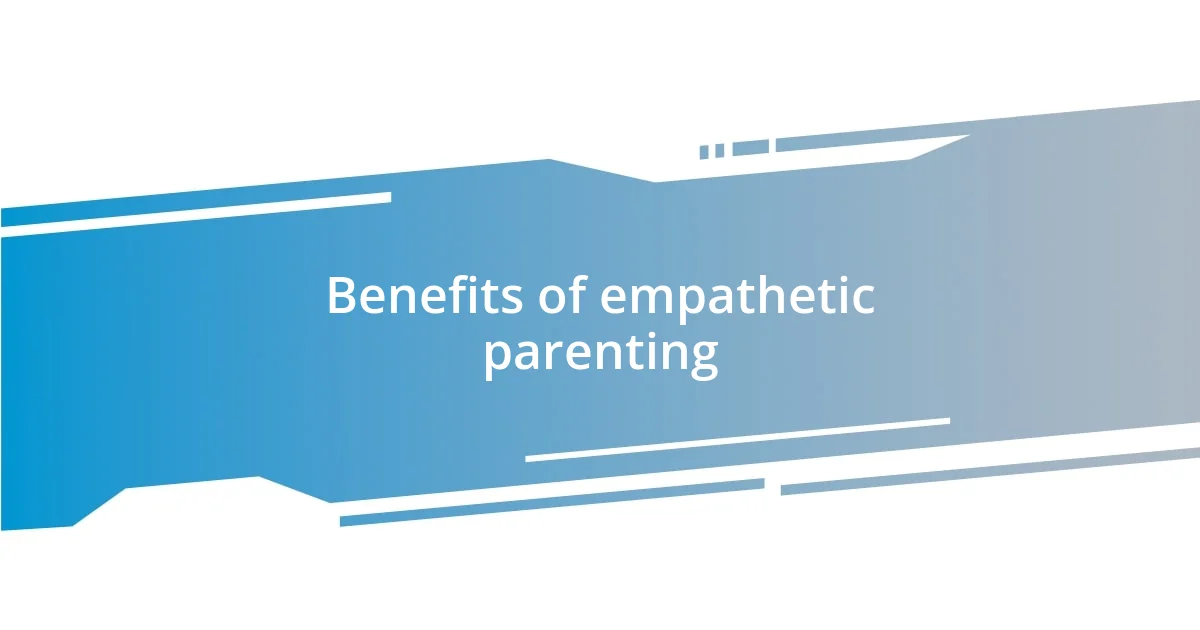
Benefits of empathetic parenting
Empathetic parenting fosters emotional intelligence in children, which I find crucial for their development. I’ve noticed that when I respond with empathy to my kids’ feelings, they tend to mirror that understanding in their interactions with peers. There’s a subtle shift I observe—they become more patient and attuned to others’ emotions, creating a ripple effect of kindness that positively impacts their friendships.
Here are a few significant benefits of empathetic parenting:
- Improved emotional regulation: Children learn to manage their emotions better when they feel understood.
- Greater self-esteem: Recognizing and validating feelings helps children develop a strong sense of self-worth.
- Enhanced communication skills: Empathy encourages open dialogue, making it easier for children to express their thoughts and feelings.
- Stronger parent-child bond: A deeper emotional connection blossoms through shared understanding and trust.
- Development of social skills: Understanding others fosters compassion and cooperation, essential for building healthy relationships.
I remember a time when my daughter had an argument with her best friend, and instead of simply advising her to “make up,” I asked her how she felt about the situation. As we talked it through, I saw her express a range of emotions—from sadness to confusion. That conversation not only helped her articulate her feelings but also reinforced the importance of empathy in her friendships, cementing a valuable lesson she carries forward.
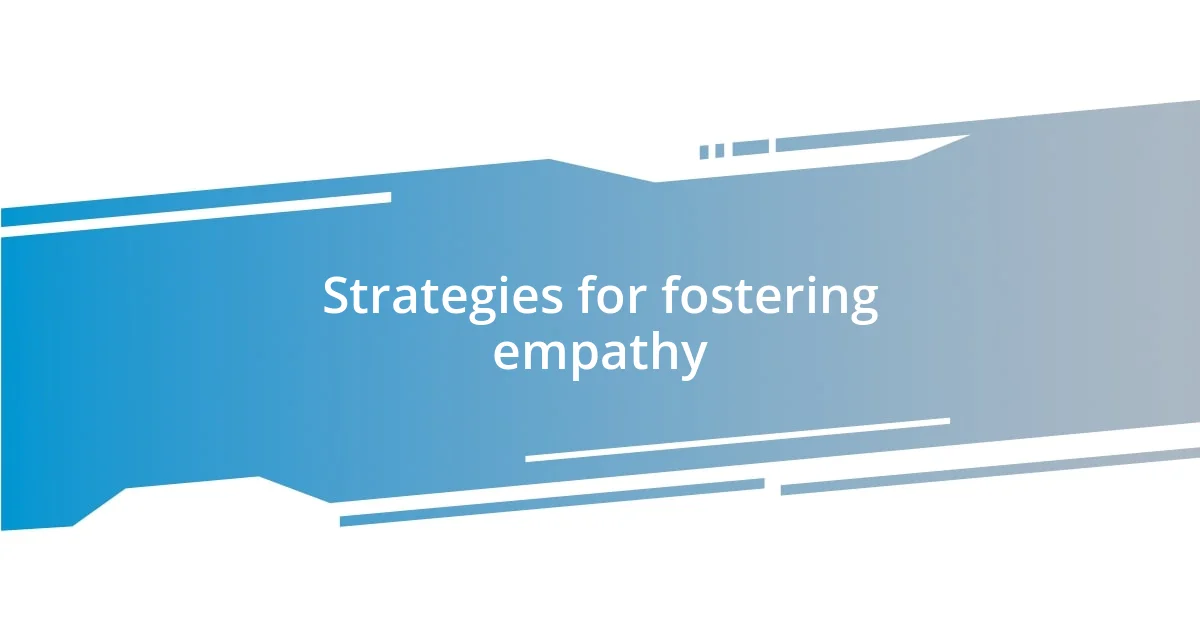
Strategies for fostering empathy
Empathy can be cultivated through everyday interactions with children. One effective strategy I’ve employed is modeling empathetic behavior. When my children see me responding with kindness and understanding to others, they begin to mimic that behavior. It’s fascinating how kids learn by observing; I often catch my son offering help to a friend who’s upset, and I can’t help but feel proud knowing he absorbed that from our family dynamics.
Another powerful method I find effective is engaging in role-playing scenarios. I remember a time when my daughter struggled to understand why a classmate seemed withdrawn. By assuming different roles in a rehearsal exercise, we navigated feelings and perspectives together. This technique opened her eyes to the idea that everyone has their battles, encouraging her to approach situations with a nurturing mindset. Has anyone else experienced those enlightening moments during play that bridge understanding?
Lastly, storytelling is a fantastic avenue for fostering empathy. When we read books that delve into characters’ experiences and emotions, I often pause to ask my children how they think the characters feel. These discussions spark curiosity and deepen their emotional awareness. I vividly recall a story we read about a character overcoming fear. Discussing it led my kids to share their own fears, creating a safe environment for expression. It’s remarkable how stories can help us navigate real emotions, wouldn’t you agree?
| Strategy | Description |
|---|---|
| Modeling Behavior | Demonstrate empathy in your own interactions to set an example for your children. |
| Role-Playing | Create scenarios where children can practice understanding others’ perspectives and emotions. |
| Storytelling | Use books and stories to discuss characters’ feelings, facilitating emotional discussions. |
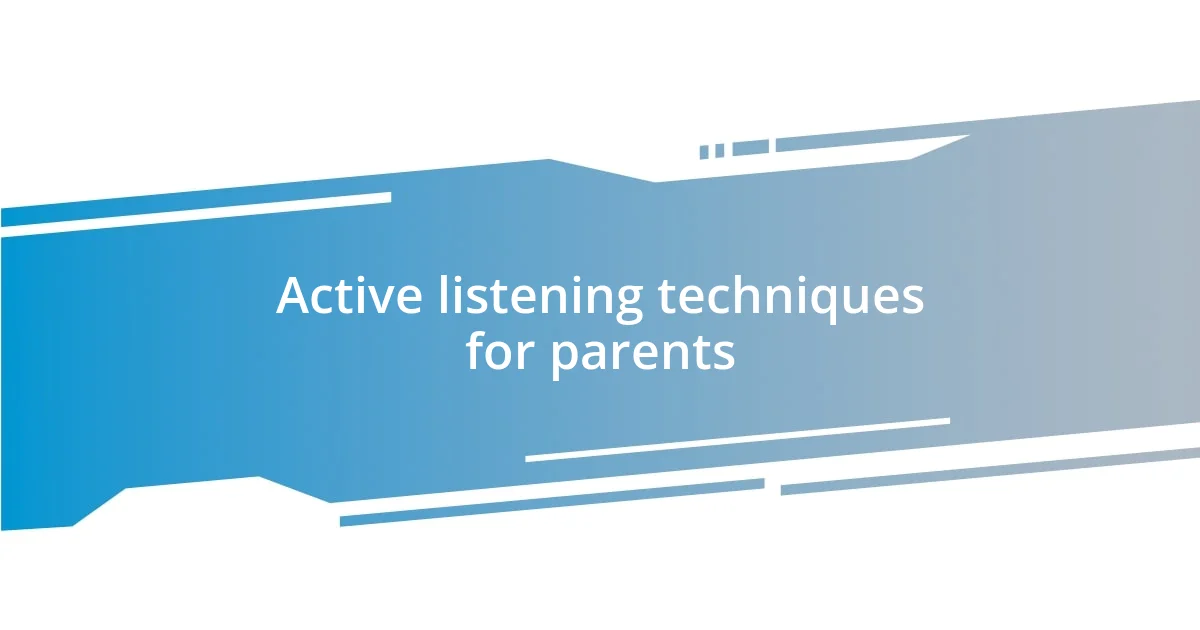
Active listening techniques for parents
Active listening is a vital skill for parents, and I’ve found that employing specific techniques can truly transform conversations with my kids. One effective approach is mirroring. When my daughter talks about her day, I often repeat back a phrase or two she said to show that I’m fully engaged. It’s amazing how this simple act encourages her to share even more, deepening our connection.
Another technique that has worked wonders is asking open-ended questions. Instead of merely asking, “Did you have a good day?” I try phrasing it as, “What was the best part of your day?” This encourages my children to dive deeper into their thoughts and feelings. I remember a day when my son shared an inspiring story about a project he worked on at school. By encouraging him to elaborate, I learned not only what he did but also what excited him about it, allowing me to share in his joy.
Lastly, I often practice reflective listening, where I summarize what my child has shared to affirm their expression. For example, after listening to my daughter describe a trying moment with a friend, I might respond with, “It sounds like you felt really hurt by what happened.” This recognition validates her emotions and opens the door to further discussion. Have you noticed how powerful it can be when someone truly acknowledges your feelings? It’s like a warm hug for the heart!
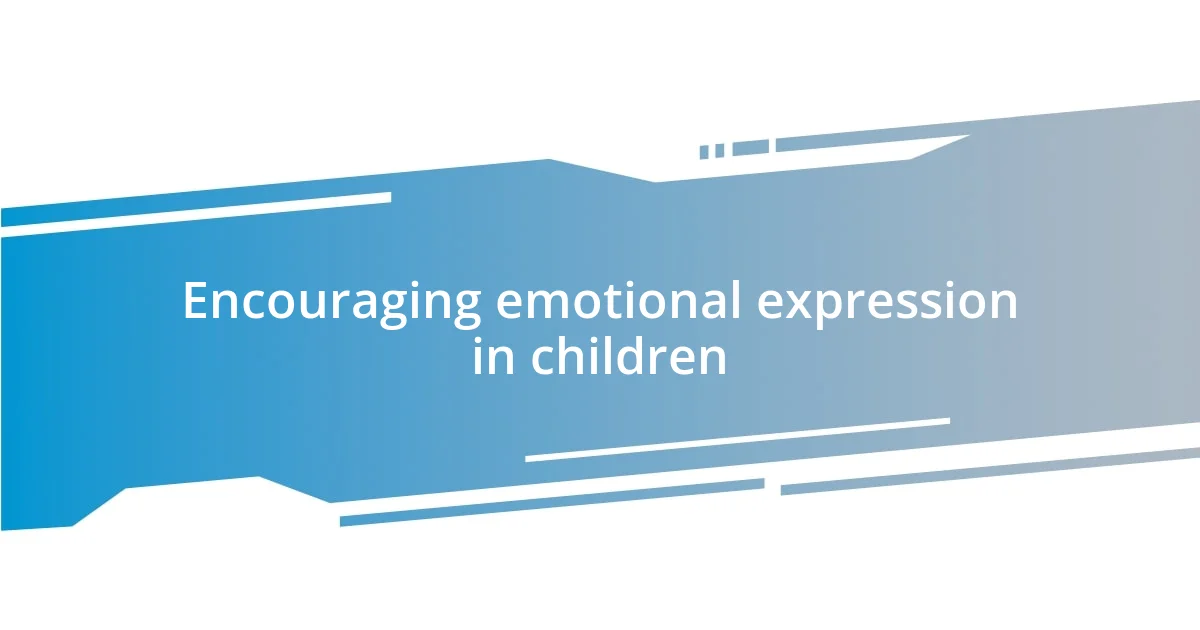
Encouraging emotional expression in children
Encouraging emotional expression in children can feel daunting, but I’ve discovered it’s so rewarding. I remember a moment when my son was upset about a friend moving away. Instead of brushing it off, I gently encouraged him to share his feelings. Initially hesitant, he eventually opened up about his sadness, and we chatted about loss and change. Reflecting back on that, I realized how crucial it was to create a safe space for him to express those emotions.
Creating an environment where feelings are valued is essential. When my daughter had a tough day at school, I made it a point to sit down and ask her how she felt. I noticed that when she spoke about her emotions and I responded empathetically, she felt heard and even validated. It made me ponder: how often do we overlook the importance of simply giving children a moment to vent? Letting them articulate their frustrations can lead to meaningful conversations.
I’ve found using art and play to encourage emotional expression to be particularly effective. During a craft session, my daughter once painted a stormy sky to represent her feelings after an argument with a friend. When I asked her about it, she explained that it represented her inner turmoil. This moment was a revelation; it reinforced just how powerful creative outlets can be for children to articulate complex emotions. Have you tried tapping into your child’s creativity to explore their feelings? It can be a game-changer!
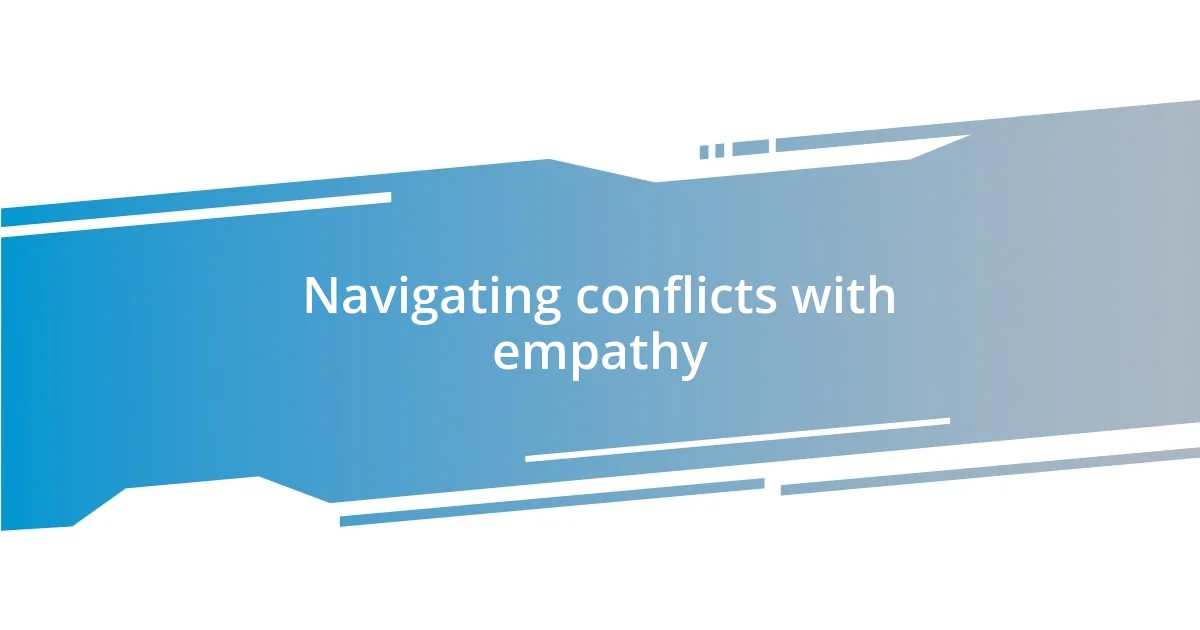
Navigating conflicts with empathy
Navigating conflicts with empathy is one of the most crucial skills I’ve developed as a parent. I recall a heated moment when my children were arguing over a toy. Instead of stepping in with authority, I took a deep breath and asked each of them how they felt in that moment. It was enlightening to witness them articulate their emotions; it turned an explosive situation into a valuable learning experience.
When conflicts arise, it’s important to remind ourselves that children need guidance, not simply punishment. I remember another instance when my son was upset after being teased by a peer. Rather than dismissing his feelings as mere childhood drama, I validated his hurt by saying, “It’s okay to feel upset about that.” This small acknowledgment created a space for him to express his emotions and let me help him see how to navigate similar situations in the future. Have you ever noticed how just allowing a child to voice their feelings can completely change the dynamic of a conflict?
I’ve also found that sharing my own experiences can help bridge understanding. There was a time I faced a conflict at work, and I explained how I managed to resolve it. I said, “I felt frustrated too, but I found that saying how I felt helped.” This connection not only showed my kids that I can relate to their struggles, but it also opened the door for them to share their own feelings and strategies. By navigating conflicts through shared emotions, we are teaching them that empathy is a critical tool for resolution in any relationship. Isn’t it amazing how these moments can foster deeper connections?

